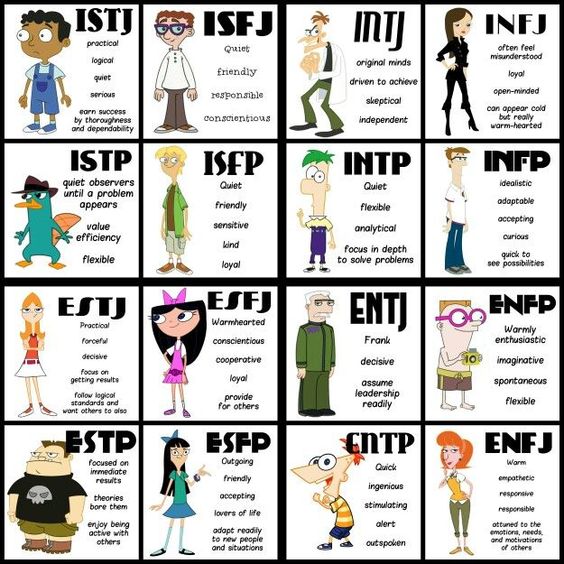Lets consider about Myers-Briggs type indicator.So first of all I am going to ask you that are you an ENTJ an INFP. Even if you've never used any Myers Briggs tools to discover your personality type, you've probably at least seen these acronyms before. This is the most popular personality test in the country. Over 2 million adults use online tools such as this to determine their personality type a shocking 89 of the Fortune 100 companies actually use this test for hiring and development purposes. I'm going to tell you the history of the Myers Briggs Type Indicator also known as The MBTI quiz and how it has become one of the most famous ways to look at different personalities. So Katherine Briggs and Isabel Briggs Myers were not world renowned psychologists, they were just a mother and a daughter who became interested in studying personalities, the duo taught themselves about the science of personality testing through their fascination with theories created by Carl Jung. Eun believe that humans experienced the world using four different functions. These functions were the dichotomies that we associate with the test today, extraversion versus introversion, sensing versus intuition, thinking or feeling and judging or perceiving at the time that Briggs in her daughters were researching humans theories, America was involved in World War Two women were looking for work at unprecedented rates, and many of them for the first time Briggs and Briggs Myers believed that if women can understand humans theories and assess their personalities, they will be able to look for jobs that would best suit their interests and personalities. So they took all of the dichotomies and created a test that would show them which side a person stood on their assessment determined whether a person was more introverted or extroverted more likely to think or more likely to feel well. The combination of these four sides created a personality type. For example, an ENTJ is more extroverted uses their intuition is more likely to think than feel. And usually judges before perceiving there are actually 16 of these personality types,
and each one is likely to have certain talents or a skill in the workplace or in specific relationships. Their first version of the assessment, the Briggs Myers Type Indicator handbook was published in 1944. For the next 50 years, the assessment would be tweaked, and three different MBTI manuals would be published, it actually contains over 80 questions in the European version, and over 90 in the American version certified professionals, they say are the only people allowed to administer and deliver the results of an MBTI. Now people can access many similar versions of The MBTI online, but unless a licensed professional is involved, they will only receive a close guess of the results. So what are the results mean? You just took a test and you're an ENTJ. But what does that mean? In order to look at the results from The MBTI we'll have to go back and look at how Karl yune believe that humans interacted with the world and how Briggs interpreted his work. You used a lot of observation and introspection to develop theories for how people take on new experiences and how they process information. Now Actually, he didn't use too many scientific studies. And this is a fact that is often brought up by critics of this personality quiz. But his work made him one of the most influential minds of the time and certainly gives insight into how we actually do interact with each other in our world use theories and Briggs work answer crucial questions about how we seek out and how we take in experiences.
They answer these questions with four dichotomies, those dichotomies being the result that make up our personality types. So let's go ahead and explore these questions and what they say about your personality. Question number one is where do you get your energy? And the answers are either extroverts or introverts. The first question pairs with the dichotomy extroverts versus introverts. And these are a hot topic in the discussion of personality psychology, almost every personality quiz seems to have at least this, but there are many misconceptions about these two labels. extroverts don't always want to get wild at a party all the time, they just get their energy from stimuli with the outside world. introverts aren't necessarily shy and secluded, they just get their energy from self reflection and staying within their own world, you can still be a social person and be an introvert. And on the other hand, you can also be a shy extrovert. Question number two is how do you take in information? Do you sense it? Or do you use intuition? Whenever you walk into a room? How do you assess what's going on? Do you prefer to get hard facts and direct answers? If so, you're probably ranking high for sensing. If you prefer to rely on your intuition, your gut, you may get a feeling for what's happening, you may look at patterns, body language and just feel the energy in the room. That means your second letter would be an end standing for intuition. So the third question is how do you actually make decisions do you think? Or do you feel once you have to act? How do you actually decide what you want to do? You might be the type of person to create a pros and cons list and rely on logical thought to make a decision. If you are you're probably scored high for thinking however, maybe you frequently go with your gut feeling and you rely on the emotions that you're feeling to make your decision, then you might have ranked a bit higher for feeling and number four, how do you organize your world? Do you use judgment? Or do you use perception when you're planning a trip you plan? Or do you leave things open to change? If you tend to be a planner, you might find yourself planning most of the areas of your life you can use your judgment to predict what you will do next and how the next few years of your life are going to look for you. If you tend to be more flexible, you might be more relying on your perception of the world. When you perceive things to be a signal for change, then you go ahead and you make that change. Now this dichotomy is in addition to us original theories, remember break did not use Unix theories word for word she simply based her personality assessment off of his work, she used it as a guide. These questions can certainly give you insight into how people work and interact with other people. And this is why it's used by so many business leaders and hiring professionals. Further research actually shows how different personality types interact with each other and how many of each type you should hire for a productive workplace. You don't want all of your employees to be extroverts, and you also don't want all of them to be introverts.











4 Comments
Nice work
ReplyDeleteThanks a lot
DeleteI gani lot of knowledge keep up the good work,thanks
ReplyDeleteYes,keep in touch with me,we can share a lot of knowledge
Delete